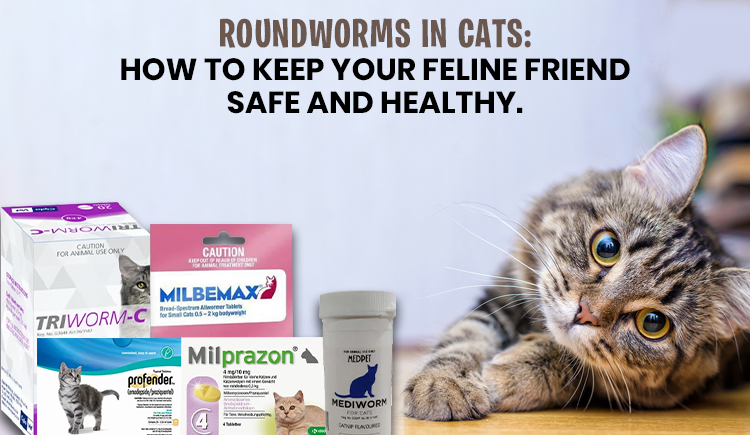
As a cat parent, all you want is the best for your feline friend. However, despite your best efforts, your cat may still be at risk for one of the most common parasitic infections – roundworms. These creepy crawlies can cause multiple health problems for your cat, but fear not! With the right knowledge and precautions, you can keep your cat healthy and happy.
Let’s look into the world of roundworms in cats and learn what you can do to protect your furry companion.
What Are Roundworms in Cats?
Roundworms, also known as ascarids, are a common type of intestinal parasite found in pets. They are typically long, white, and cylindrical resembling spaghetti noodles, and can grow 3–6 inches long.
What causes Roundworms in Cats?
Roundworms in cats are transmitted when they ingest infected feces or prey animals or come in contact with contaminated soil.
Although kittens are most likely to get roundworms, cats of all ages are susceptible to infection. An adult female roundworm living in a cat’s intestines releases eggs that are flushed out into the environment through the cat’s feces. These eggs develop into infectious larvae.
A roundworm-infected pregnant cat can pass the infection to her kittens during pregnancy through the placenta. Kittens also get infected through the milk of an infected mother cat. Cats of any age can get the infection by ingesting the eggs from the soil or larva-infested rodents.
Symptoms of Roundworms in Cats
Symptoms of roundworms in cats can vary depending on the severity of the infestation. The signs of intestinal worms in cats include:
• Poor growth
• Diarrhea
• Loss of appetite
• Weight loss
• Vomiting
• Respiratory symptoms
• Bloated abdomen
• Intestinal Thickening
• Swelling of the duodenum
• Indigestion
In rare cases, a life-threatening situation may be caused by the bursting of the intestines.
Treatment of Roundworms in Cats
There are many oral and topical treatments available for cats that effectively treat roundworms. Multiple doses of treatments should be given on a schedule to kill all life stages of roundworms.
Treatment of roundworms in cats typically involves deworming products, which are designed to kill parasites in the intestines.
Here are some of the popular roundworm treatments for cats:
Profender
Profender is a potential treatment that works against multiple worm infections in 8 weeks and older kittens and cats.
It helps in controlling various intestinal worms like tapeworms, roundworms, and hookworms. Profender eliminates worms with a single dose and regular treatments should be given at an interval of every 3 months. This is safe to be used on pregnant and lactating cats.
Milbemax
Milbemax is a broad-spectrum deworming treatment for kittens and cats aging at least 6 weeks.
It is effective against different gastrointestinal worms like roundworms, tapeworms, and hookworm. Milbemax effectively protects your feline against heartworm infection as well. It is suitable for all cat breeds and can be used in pregnant, lactating, and breeding cats.
Mediworm
Mediworm is highly effective against multiple infection-causing worms including hookworms, roundworms, and tapeworms. This is a highly palatable oral tablet that comes in a catnip flavor. It does not cause side effects like nausea or vomiting. It is safe for use in kittens, pregnant and lactating cats.
Triworm – C
Triworm-C is specially formulated to protect all felines including young kittens and old cats from intestinal worms such as roundworms, tapeworms, and hookworms.
It kills initial larvae stages to prevent the growth of worms and eliminates adult worms by affecting their nerve cells.
Milprazon
Milprazon is indicated for use in 6 weeks and older kittens and cats. It is also safe to use in pregnant and lactating cats.
This wormer is easy to dose as it comes in tablet form and is composed of two high-quality ingredients (Milbemycin Oxime and Praziquantel). This formula treats tapeworms, and roundworms, and prevents heartworm infection. Milprazon is available in two-pack size kittens & small cats and, medium & large cats.
Also, Read- Microchip Your Pet Month: Gift a Permanent Identification to Your Pet
Prevention of Roundworms in Cats
Roundworms are common in cats, and keeping your cat parasite-free is necessary for their excellent health. To prevent this infection:
• Clean litter boxes daily
• Use an effective disinfectant
• Avoid raw meat diets
• Stop your cat from hunting rodents
• Deworm regularly with vet-recommended treatment
End note
When roundworms are detected early and treated in time, cats can recover in 2-6 weeks, depending on the severity of the infection. Cats return to normal life after the infection is treated. A re-infestation is likely possible if your cat is exposed to roundworm eggs or infected rodents.

